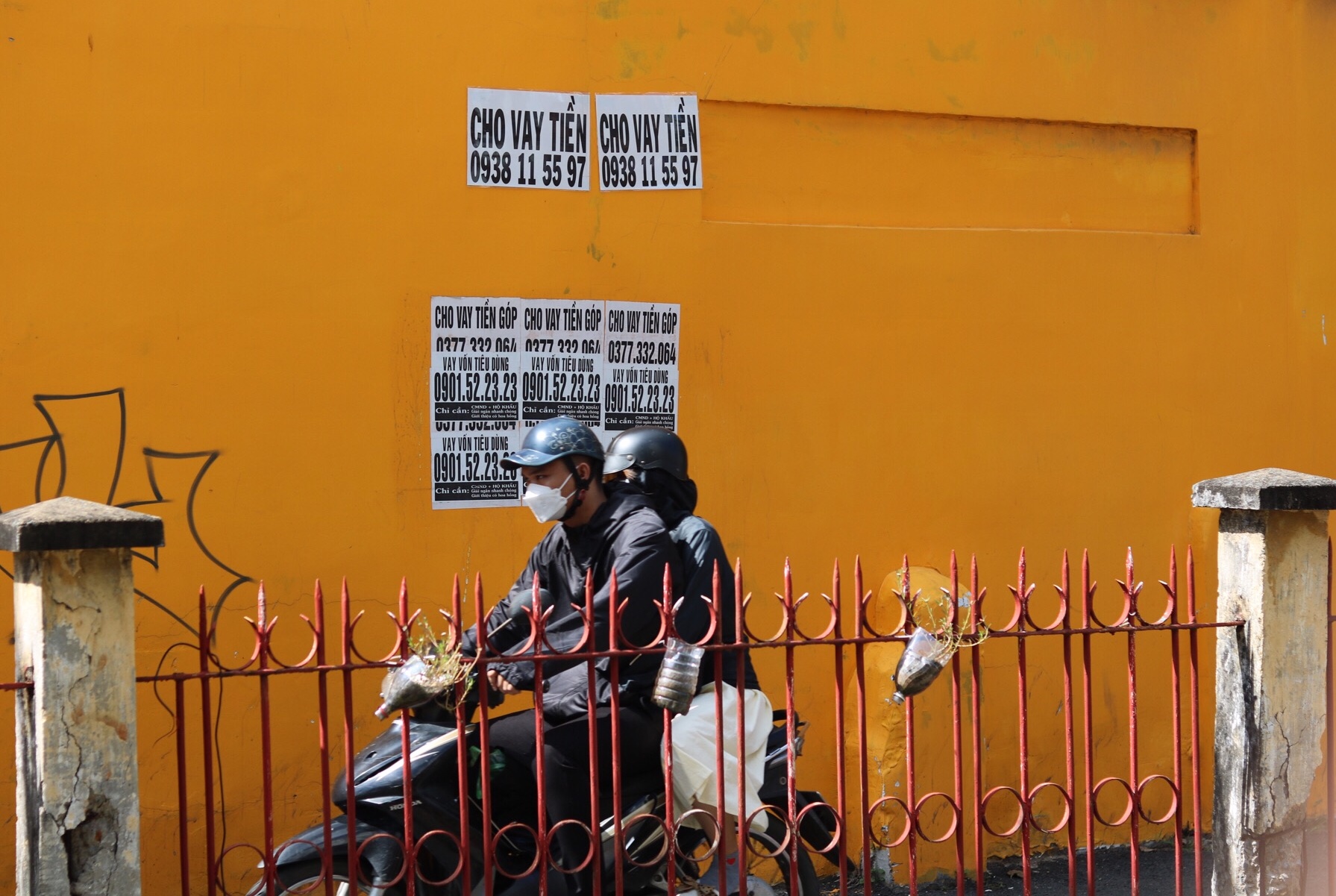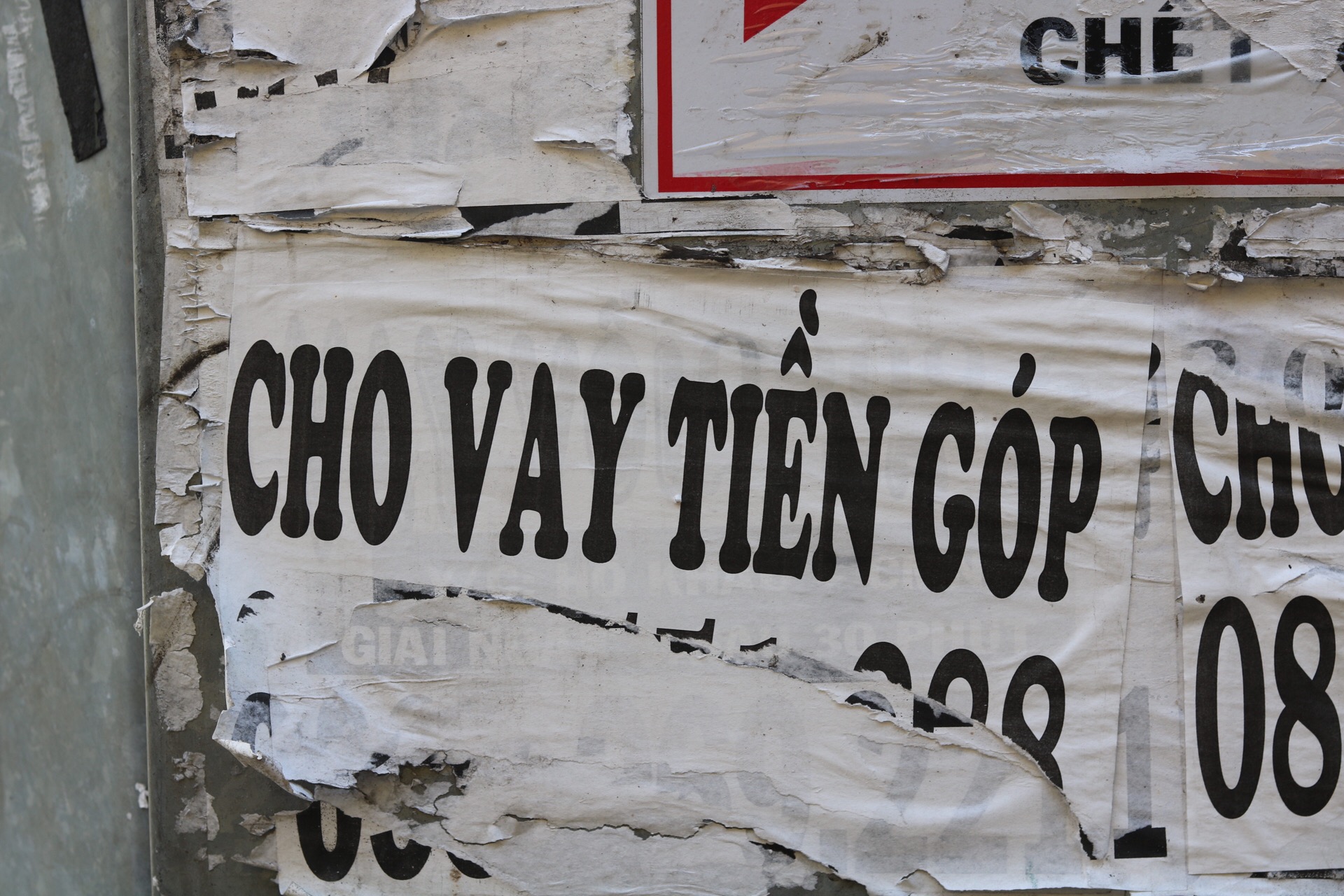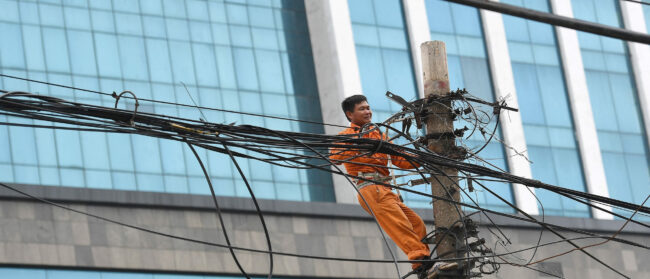Flyers with the words Cho vay tiền góp, ‘installment loan,’ are plastered onto the sides of buildings, electricity poles and stop lights in Vietnam’s economic centre, Ho Chi Minh City. Calling the phone numbers listed on the papers promises fast cash with exorbitant interest rates and the fear of a credit gang tracking you down for repayment.
“I heard the story of a couple who had to deal with a loan shark… It happened last year in March in Saigon,” Ngo Huyen said. “They borrowed money for business but the interest rate was so high, more than 40%. They got the borrowing money address from flyers.”
Unable to repay the loan, the pair fled for their safety.
“The couple is still hiding and they changed their address and phone number. I heard they got indebtedness of around 400 million VND [$17,647] but the interest went up to more than 2 billion VND [$88,237],” she said.
Although a burgeoning consumer finance industry has taken root in Vietnam, weak regulation has allowed many financial institutions to harass borrowers, pushing the bounds of legality. Some legal lenders mirror loan sharks: disturbing borrowers’ relatives, posting smear photos online and going to borrowers’ houses to pressure them to pay off their loans.
The economic impact of Covid-19 has left many financially drained in Vietnam and issues surrounding bad debt have been exacerbated. During the first quarter of 2020, local banks reported a 45% increase in past-due loans. Since then, the country has experienced its worst period of the pandemic. In late April, the Delta variant arrived in the country, crippling the economy and increasing the death toll from 35 to more than 23,000 in mid-November.
From July to September, Vietnam’s gross domestic product shrunk by 6.17%, the steepest decline on record since the General Statistics Office began reporting quarterly growth rates in 2000. A survey taken in September found 62% of 69,132 participants lost their jobs because of Covid-19.
While the Vietnamese government has encouraged formal lenders to restructure repayment periods, waive or reduce interest rates and fees to support borrowers during the pandemic, many report these directives are not being followed.
“During the Covid-19 epidemic, it is very complicated, and affects everyone, so the problem of late payment is inevitable… When the Covid epidemic happened, and they were late to pay, these companies began to act with intimidation,” said Hieu Nghia, who supports borrowers encountering issues with debt collection in Vietnam.
“Because Vietnam’s civil law has many unspecified things, financial companies often circumvent the law to lend and continue their operation,” he said. “There are acts of threatening and defaming the borrower’s honor when paying late.”

The presence of illegal money lenders, commonly known as loan sharks, peddling cash with sky-high interest rates is common in Vietnam. In 2019, the Ministry of Public Security investigated 210 loan shark rings believed to have been operated by more than 2,000 people.
Formal consumer finance took off in Vietnam in the past decade. While authorised lending is promoted as a solution to loan sharks, heavy-handed debt collection persists due to a lack of regulation.
A trailblazing company in the official money lending realm, FE Credit, has emerged as one of the country’s most controversial.
“Consumer finance really took off 10 years ago with FE credit proposing new types of loans to the masses, something that didn’t happen before,” said Nicolas Lainez, a visiting fellow at the ISEAS-Yusof Ishak Institute. “Between traditional loan sharks and consumer finance groups, some practices are similar.”
FE Credit operates under one of Vietnam’s largest private financial institutions, Vietnam Prosperity Commercial Bank, or VP Bank. FE Credit describes itself on its website as a “leader in the consumer finance market” which has helped “10 million Vietnamese to solve their financial difficulties.” The company, valued at $2.8 billion, is the biggest formal lending firm in the country.
Dang Cao Trinh, an analyst at Dezan Shira and Associates in Ho Chi Minh City, said controversy has arisen due to FE Credit’s alleged harassment of borrowers.
“They still operate like an informal [loan provider]. They will call you a lot of times. I heard that they used to send lots of people to your house to ask you to pay for the money just like a gangster.”
Representatives from FE Credit could not be reached by phone or email.
Hieu Nghia began helping borrowers overcome difficulties with bad debt when he saw the way it tore families apart. He pointed to an example from last year when a married couple took out a loan from FE Credit. A debt collector came to the couple’s home in Ho Chi Minh City’s Go Vap District on 19 June and threatened to kill the man if he did not pay by 22 June, according to a news report. On 21 June, the husband, Le Thanh Tam, died by suicide.

“There are cases of financial suicide, so a word of encouragement and sincere guidance will help them a lot,” Nghia said. “The family is broken when threatened, so I accept to support the borrower.”
Groups proliferate online with thousands of members seeking advice on dealing with FE Credit’s harsh collection practices.
Thao Nguyen in Ho Chi Minh City has seen text exchanges shared on Facebook in which borrowers are threatened.
“[The debt collector] said in the text that if you don’t pay money you have to pay by blood and in 24 hours they will shame the victims on social media,” she said. “[They] even threatened the whole family’s safety.”
Huan Le is a member of the Facebook group, Tẩy Chay Fe Credit, or boycott FE Credit with more than 11,000 members.
Three years ago, Le purchased a phone using a consumer credit card FE Credit offered. After fully repaying the loan he stopped using the card and eventually lost it. Late last month, FE Credit began calling and claiming he still owed the company money.
“One week ago they called me and said I owe them 1,200,000 [about $53] while I lost my card and didn’t do any transaction with FE Credit,” Le said.
“They called me more than ten times,” he added. “I said I didn’t spend that money. Of course they don’t accept it and they keep saying I owe them. I just downloaded a call-blocking app and I will be blocking calls from them in a few minutes.”
A week after Le blocked calls from FE Credit, they contacted his mother. “FE Credit just called my mom and threatened to force me to pay,” he said.
The legal grey area in which consumer finance operates has allowed FE Credit and similar financial institutions to harass customers, the analyst Trinh said.
“There’s no specific regulation or no specific guidelines in terms of how they will be punished,” he said. “If they [FE Credit] keep sending people to your house or calling you so many times a day, there is no punishment, no guidelines, no regulation in terms of that.”
Wishy-washy directives have also hindered pandemic easing of loan repayments for Vietnamese. Although a circular issued by the State Bank of Vietnam in March 2020 called for credit institutions to restructure repayment periods and waive or reduce interest rates, the protocol is not legally binding.
“It is up to the financial institution if they really want to restructure the repayment period and waive the interest and fees. It’s not their obligation,” Trinh said.
Non-performing loans – those unlikely to be repaid in full – increased by 30% in 2020 compared to 2019. In September, the state bank issued another directive amending previous circulars about easing debt for individuals and businesses impacted by Covid-19.
“From my perspective, this circular shows the government is really concerned about what is going on during the pandemic,” Trinh said.
We cannot expect a country like Vietnam to do all these steps of consolidation in a few years. It is impossible
Like previous directives, lenders are not obliged to follow the circular, Trinh noted. A long list of criteria to be met by borrowers further hinders the likelihood individuals will be considered worthy of assistance, especially as some benchmarks are open to the loan provider’s interpretation. Eight criteria need to be met for debt rescheduling, with one based on the lender’s perception of how the pandemic has affected the borrower.
“Basically there’s no regulation in terms of how a financial institution will assess your company’s financial health. So you can’t do anything if they come to your company and say okay, we think that your company is not really impacted by COVID-19,” Trinh said. “If they really want to give you that particular assistance or not, that really depends on them, because you need to satisfy all those criteria.”
As Lainez noted, time is needed for an industry to build itself up in a country. Vietnam is still in the early stages of consumer finance and issues are expected to arise. Finding common goals among borrowers and lenders and the implementation of successful legislation will take time.
“In the US the consolidation of the consumer finance industry took 60, 70 or 80 years,” he said. “We cannot expect a country like Vietnam to do all these steps of consolidation in a few years. It is impossible. It doesn’t work like this. Meanwhile, there will be imperfections, there will be things like this heavy-handed collection.”
While the industry matures and many face financial difficulties during Covid-19, Trinh worries many Vietnamese will turn to informal lenders as the quickest source to satisfy the demand for cash, increasing illegal loans and bad debt in the country.
“I see a lot of posts on Facebook saying that they really need milk for their children because they have no job at all,” he said. “As long as the pandemic is still there the demand for that particular system is still really high.”


